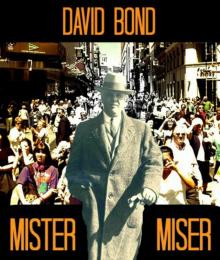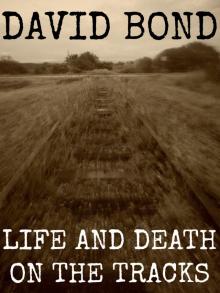- Home
- David Bond
Life and Death on the Tracks
Life and Death on the Tracks Read online
Life and Death on the Tracks
By David Bond
Copyright 2014 David Bond
Thank you for downloading this ebook. You are welcome to share it with your friends. This book may be reproduced, copied and distributed for non-commercial purposes, provided the book remains in its complete original form. If you enjoyed this book, please return to your favorite ebook retailer to discover other works by this author. Thank you for your support.
Table of Contents
Title Page
Life and Death on the Tracks
About David Bond
Other books by David Bond
Harold lived on the tracks, and presumed he would die on the tracks. Ever since he first stood over the railway bridge as a child, peering down over the edge and getting a face full of steam and hair full of coal dust, he knew what his vocation in life would be. Life became so refreshingly simple. He would help out around the local sheds, learn his trade, and work his way up to eventually become a train driver. Harold knew even then, with his first intensely visceral encounter with a steam engine, that his passion would enable him to quickly achieve his dream and live out his dream job. Harold knew that only an act of God would persuade him to give up this dream.
Harold's only other passion away from the tracks was his loving and devoted wife Mary. Despite both being at an age where one may expect them to be visited by noisy grandchildren, their cottage was a place of serene solitude. The couple never had children due to medical reasons, but they both overcame the grief relatively quickly, as their love for each other was enough to comfort them. When Mary wasn't busy mingling in the local village and visiting her many friends she would greet her husband at the edge of the platform at their local station. Harold never failed to keep a bouquet of fresh roses in the driver's cab, and whenever he caught glimpse of his wife in the distance he felt an excited rumbling in his gut, and made sure to hold out a single red rose to Mary, who could grab the rose as the engine trundled into the station.
Even after almost fifty years of working as a train driver on his local branch line Harold had no plans on retiring. His idyllic passion for the job had not wavered since childhood. Harold had no need to mournfully look back on his failed childhood dreams, and therefore did not become cynical with old age, as he was living out his first and only childhood dream. His enduringly simple and happy life free from being saddled with regrets also meant the fear of death was greatly lessened. Harold still loved to comb out the coal dust from his hair, but now he often coaxed out large clumps of greying hair.
Harold was getting old, but did not care. His was a life spent in happiness and death could greet him warmly. Of course, he would greatly miss life, but he knew that those who feared death the most were those that had failed to grasp the momentary nature of life and truly enjoy it. Harold was not one of those people. He had nothing to fear.
However, as positive as Harold was about life and death, he could not halt the ageing process. Harold's career as a train driver was approaching its final destination, which Harold was bluntly reminded of every time he pulled into his terminus home station. He hated the sight of the buffers and their bright red blaring lights, and fervently wished he could plough straight on through to the other side and never stop the journey. Some of his closest friends had suggested that Harold retire, but he bluntly rejected these suggestions, affirming that he would sincerely like to die on the footplate.
Adding to the increasing sense of his limitations was another, more immediate, source of stress. The branch line was struggling financially, and whispers of closure were being bandied around town, especially as other branch lines in the region had already succumbed to the cutbacks. A young apprentice asked Harold if their line would close, and Harold glibly replied.
‘I don't know boy. It depends on figures drawn up on a spreadsheet by a fat man in London.’
The young boy wanted more information but could not coax it out of Harold, who chose to avoid the gossip going around town as best he could. He absolutely did not want to hear it, and chose to live in blissful ignorance rather than face the grim reality of the situation. He could scarcely avoid the situation however - it was obvious that traffic on the branch line had fallen drastically in recent years, and entire carriages were pulled along by Harold silent and empty, devoid of life. Some rather mean spirited individuals in the community tauntingly referred to Harold as the 'The Ghost Driver', referring to his increasingly pale complexion. They referred to his haul as 'The Ghost Train'.
Worse was to come one chillingly cold November morning when a minor altercation escalated towards terrifying proportions and swiftly ended Harold's long working life. Harold was walking to work across the same railway bridge he had used as a viewpoint years before when he heard shouting from behind. It was the same group of locals who had taunted him on regular occasions, and this time was no different. Harold ignored them as he always did, feeling not anger but sympathy for the men abusing him. He felt that the source of their ire was simply envy. The locals soon passed Harold, who was left alone.
Harold was stopped in his tracks by the latest set of taunts, and peered over the edge of the railway bridge in shock. All the memories of his youth came flooding back to him, and he finally realised that his years were catching up with him. Harold was no longer in good condition physically, and any undue stress on his heart was not to be welcomed. Harold blacked out, slumped against the bridge. No trains passed by.
That morning, Harold awoke after surviving his first heart attack. That afternoon, authorities announced another set of grim financial figures for the branch line, leading many to ponder not if the line would close, but when. The news did little to help Harold's recovery, who found it difficult to adjust to life without the trains. He had never taken a sick day during his entire working life, and found it difficult to cope with the knowledge that he may never work again.
The next few months were the toughest of Harold and Mary's lives. Harold was deeply unwell, and Mary was not fit enough to deal with the full time job of caring for her elderly and increasingly frail husband. Mary could not bare to see her husband consigned to the bed, but equally she could not bare to leave his side. The couple, once such a fixture in and around the village, gradually retreated from public view. Mary stopped visiting her friends and was rarely seen in the village, preferring to devote herself to her suffering husband.
Her valiant efforts were in vain. Harold was greatly appreciative of his wife's health, but they both knew she was watching him slowly die. Therefore, exactly four months after his heart attack, Harold gently but assuredly asked Mary to kill him. Mary was both shocked and saddened by the request, but knew that it was the right course of action. Her husband was on a slow decline towards death, and there was nothing Mary could do to halt it. Harold explained to Mary that in order to effectively ease his and therefore her suffering she needed to end his life herself.
Within a few days of the morbid request, Mary accepted her role in theory. In practice, the task was complicated due to the illegality of the proposed course of action. Mary feared prosecution. Harold was left appalled knowing that neither he nor his wife had control over their own affairs, and became more and more depressed with each passing day.
Exactly two weeks after Harold's morbid request, the branch line shut down. On that afternoon, Harold went missing. Mary had gone up to Harold's bedroom that morning to be the bearer of bad news, only to find the bed made and unoccupied. Mary knew her husband wanted to die, but she instead found him missing. She worried greatly that her old, confused husband was wandering outside, alone. She would have been happier knowing he had died, rather than simply disappeared.
In the weeks and months f
ollowing her husband's disappearance, Mary consigned herself to her home, venturing out only when strictly necessary. She distanced herself from many of her old acquaintances and rejected help of any kind. On the rare occasion that Mary did escape the confines of her home, the locals were taken aback by her fleeting appearance. Once such a bright presence in the village, months of isolation had rendered her skin deathly pale, and she drifted silently around the streets, disappearing back into her increasingly dilapidated home not soon after she was spotted. The same locals who had taunted her husband now taunted Mary, referring to her as the 'Ghost Driver's Wife'. Local children were afraid to go near her house, fearing it was haunted.
Despite her self-imposed isolation from the village, Mary was neither blind to the staring eyes of the locals nor was she deaf to the rumours they circulated, not just concerning herself but Harold also. She heard locals speaking in hushed tones, documenting clickety-clack sounds coming from the railway tracks. Some claimed they heard these sounds at the exact time the

 Mister Miser
Mister Miser A Sweet Blitz
A Sweet Blitz SkyDie
SkyDie Life and Death on the Tracks
Life and Death on the Tracks